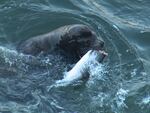
New research suggests sea lions are eating more salmon in the Columbia River than previously thought.
Courtesy of Oregon Department of Fish and Wildlife
California and Steller sea lions took a bigger bite out of last year's salmon run than in any previous year, according to a new federal report.
2015 saw a bigger salmon run, with more than 239,000 Chinook and steelhead migrating past Bonneville Dam.
That year, the total number of salmon that sea lions ate was the largest ever recorded. The Army Corps of Engineers recorded more than 260 sea lions eating more than 10,000 fish from January to June 2015.
A year after one of the largest runs in recent Columbia River history, the numbers of migrating salmon fell. 2015 recorded only about 154,000 of the migrating fish, just below the 15-year average at the river's westernmost dam.
The 2016 salmon run was far smaller, but the sea lions' appetite for salmon didn't shrink much. They still ate more than 9,500 fish, nearly 6 percent of the run. That's the largest share of the run eaten by the large marine mammals since Army Corps scientists started watching 15 years ago.
Corps officials acknowledge that the numbers only reflect what scientists observed on the water's surface at the foot of Bonneville Dam, and doesn't include what sea lions eat at other parts of the river, or consume underwater.
"Both California and Steller sea lions consume adult salmonids at the surface," the Corps said in response to an emailed question from OPB. "However, our estimates should be considered as minimum estimates."
Oregon and Washington wildlife officers received federal authorization to kill California Sea Lions five years ago, as one of many efforts to restore declining salmon runs. Officials captured and euthanized dozens of the animals in 2016.

